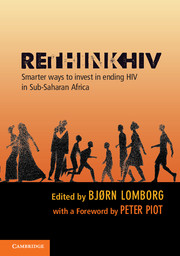Introduction
Published online by Cambridge University Press: 05 November 2012
Summary
There has been commendable progress in the fight against HIV/AIDS, but the time for a declaration of victory has not yet arrived. Humanity has struggled to eliminate diseases even when they are totally curable and preventable. AIDS – a disease which we do not yet know how to cure, and which we struggle to comprehensively prevent – has proven an immensely difficult adversary. It is still the biggest killer of women of reproductive age worldwide, and of men under the age of 40 in sub-Saharan Africa, where the pandemic is also responsible for 14 million orphans.
Sub-Saharan Africa continues to bear a disproportionate share of the HIV burden. With just 12 percent of the global population, the region accounted for a staggering 68 percent of all people living with HIV in mid-2010 (World Health Organization, UNAIDS, UNICEF 2011). While the number of new infections is decreasing, the 1.9 million people who became infected in 2010 represented 70 percent of all new cases globally (World Health Organization, UNAIDS, UNICEF 2011). For every person receiving anti-retroviral treatment, two others get infected, so HIV continues to exact an enormous socio-economic toll on a continent whose time is ripe for growth.
- Type
- Chapter
- Information
- RethinkHIVSmarter Ways to Invest in Ending HIV in Sub-Saharan Africa, pp. 1 - 8Publisher: Cambridge University PressPrint publication year: 2012

